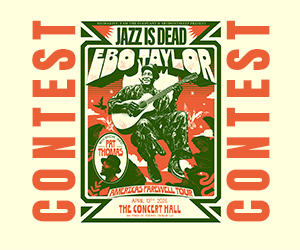PAGES
A CONVERSATION WITH BIG WRECK’S IAN THORNLEY
Ian Thornley has seemingly led Big Wreck into a renaissance period. Hot off the release of a trilogy of EP’s released between 2021 and 2023 – 7.1, 7.2, and 7.3 – the Canadian rock icons are set to drop their latest record, Pages, their second EP for the year, on November 24. Speaking on the quickfire nature of how the band is operating, Thornley digs into the songwriting and recording of Pages.
Big Wreck continues to chart new musical territory while still remaining true to what its audience loves and expects from the band: their sound. With this in mind, Pages feels slightly experimental as Thornley and his band indulge in progressive formats – longer track lengths filled with frequently shifting musical passages – without actually feeling like progressive rock or metal. Thornley reflects on this idea, stating, “The same stuff is always there, it’s just a matter of if it’s the right time and right place for a certain influence to come out. For example, ‘Bird Of Paradise’, I don’t think would have made it except for the fact that I had sent it to Nick [Raskulinecz, producer]… It was just so different, this Abacab, synthy part… ‘In Fair Light’ is another one that only made it because I sent it to Nick as an instrumental – kind of envisioning a ‘Tangerine Dream’ meets Genesis.” He adds, “I don’t want to use the word prog because it’s not what we traditionally think of with prog, but there are these prog elements in there.” Reflecting on this revitalized approach to writing music for Big Wreck, Thornley states, “With these polyrhythmic synth lines, I had to ask myself, ‘is this something I would have done 15 years ago? Probably not. But maybe, it is something I would have done with a guitar’… It felt like somewhere we haven’t been, a place we haven’t explored. Why not?” Despite this, in fact, Pages feels like quintessential Big Wreck.
Reflecting on his creative process, Thornley states, “The writing starts as it always does. I begin by sifting through hundreds of sketches and waiting for one to inspire me in some way. I’ll take that sketch and throw it into the process of demoing it out, putting it under the rolling pin to see what it’s got… But of course, it’s so easy to move onto a new sketch within this process.” What makes this particular era for the band stand out is the rapid clip of Thornley’s creativity, adding, “I hit a pretty hot streak with my writing. I was on a song-a-day pace with my writing for a few months… It came down to narrowing them down and refining them before bringing them into the studio.” The record, much to Thornley’s surprise, was equally as quick, “We booked two weeks at Nobel Street. The primary focus there was to get the drums down, and maybe the bass, for 18 songs… We expected a few weeks for the drums, but Sekou [Lumumba] got them done in just a few days. Not to be outdone, Dave [McMillan] had all the bass done in a day and a half.” Thornley adds, “Dave was going at such a clip that I was calling management about getting the guitars and amps out of lock up. I assumed I’d do the guitars at another date, but I ended up doing them in those same two weeks.” This allowed for Thornley to complete the vocals in his home studio, stating “I did the vocals myself at home. I took care of all the roles, lyrics, engineer, and vocalist…It’s a little less refined as far as a performance goes vocally, but I like that. I wanted the vocals to feel like they’re from a human being.” Vocals aside, the band recorded drums, bass, and guitars for 18 songs in just two weeks, a true testament to the musicianship and chemistry within the band.
Of these 18 songs, six appear on Pages. “The idea was to roll it out like the 7 series… We came out with three new EP’s” Thornley tells me. This decision to switch out full-length albums for EP’s was a reaction to modern consumption habits. “I noticed our attention spans are getting shorter, including my own… I just felt that we’re an album kind of band, a deep cut kind of band rather than a singles kind of band. I was increasingly disheartened that some of our better work was overlooked because it wasn’t the single that the record label chose. As a song writer, I put equal focus into what I think will become a single as I do the seven-minute opus at the end of the album. I don’t pick singles – to me, if a song makes it that far off the cutting room floor, they’re all of equal value… It’s such a bummer that a song doesn’t get listened to just because its song number ten.” With a brief stipulation, he adds “We figured it would be an interesting experiment to release things in bite-sized morsels. You need to understand that, as a band, we are still going into the studio and cutting an album.” Despite being released across a span of two years, the 7 series is incredibly coherent, playing like a strong album when played back-to-back. Given the recording process for Pages, it feels safe to assume this collection will carry the same level of intention.
With Pages dropping this Friday, Big Wreck is already a few weeks deep into their North American tour which wraps up on December 2 at History in Toronto. While is remains unclear, even to Thornley, as to when we should expect the second installment of Pages, given the pace they’ve maintained, it is very possible to look forward to a follow-up EP within the year. Regardless, through both quality and quantity, this current era of Big Wreck continues to be truly exciting.











